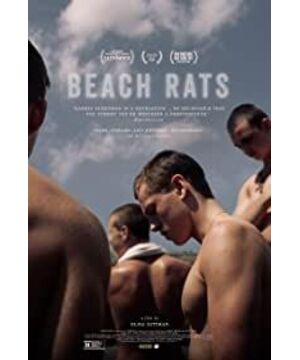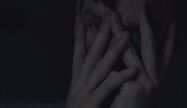"Beach Rats", literally translated as "beach rats." Rats are nocturnal creatures, with their own "rat path", they act cautiously and are rejected and spurned by humans. They are on the same earth as human beings, but they don't get their due status. In a sense, they are subject to the cruelest prejudice, and don’t homosexual people also face this dilemma?
The director used "beach mice" to allude to gay people like Frankie. He was afraid of the worldly vision. He wanted to escape from his gay identity, but he was confused and helpless. Only in the remote corners of the beach at night, sex with gays, like a mouse, sneaky, afraid of being grandiose.
Being in a melting pot of immigrants like Brooklyn, assisted by various cultural influences, sex, marijuana, disco, black music, psychedelics, gaming halls and a series of external factors, Frankie feels like it. He was lost, as if he didn't belong here, but he didn't know where he was going. His struggles and confusion about his own sexual orientation run through the movie. The delicate and complicated inner activities of the characters are endless and meaningful.
The implicit and inner emotional performance is absolutely indispensable here, and sometimes Frankie stands there, one look covers the whole confusion. At the same time, the director is extremely keen to capture the inner fluctuations of the character. As a female director, Hitman has incorporated the romantic tenderness unique to women, like Frankie suddenly saw the confusion of his mother finishing stockings, the loss of playing in the rain, and the sun. The sad back figure is not only a reflection of the character's heart, but also reflects Hitman's own sensitivity to images. Unlike the madness of other same-sex movies, "Beach Mouse" is more sensible, and this sensibility is psychedelic and slightly hazy.
In fact, the tone of the haze was established in the opening flash selfie. Frankie under the lens is sexy, especially the close-ups of various parts of the body, sultry, but with a melancholy infatuation. At this moment, Frankie is confident. He is particularly obsessed with the body and longs for others' approval. This forms a sharp contrast with the loneliness at the end. But this kind of contrast has no sense of difference, and its role is to emphasize a kind of tragedy of Frankie himself.
The collapse of patriarchy, the lack of family communication, and the poor and narrow Frankie social circle seem to be the source of this tragedy. The director didn't give the audience too much information about Frankie's identity, we only know that he has nothing to do all day. This kind of very simple and simple description of the character's identity can actually make the audience gradually get closer to Frankie's heart.
In fact, Hitman, who writes and directs himself, is also very confident that the audience can immerse himself in the screen. The narrative does not have a clear main line. It mainly revolves around Frankie. It is not known for drama, but directs the camera. Frankie's heart has reached a kind of appeal from the inside and the outside. Especially under the structure of prose poems, there are emotional auspicious lights everywhere, scattered on the streets, seas, smoke rings... This extremely personal expression is more real and candid.
The youth in the lens is of course restless, summer, beaches, bikinis, dancing and so on, but in the bones it is calm, not frivolous, nor crazy. More is smart, more is Shutai. The director made such a comfortable youth a foundation for such a confused Frankie, just like Frankie's dynamic desktop: If youth is the sea with layers of waves, the bewildered seabird is Frankie himself.
He is not like the young man in "The Beast in the Cabinet" who finally emerged from his inner shadow, nor the last warmth and soothing of "Moonlight Boy", let alone the unforgettable love like "Happy Together". What we are surprised is that the director did not set Frankie a fixed partner at all. Such a script setting is cruel to Frankie and to us. So, everything returns to Frankie itself, he is this movie, and his own temperament is the keynote of this movie.
In his heart, he was somewhat resistant to his same-sex orientation. This resistance actually originated from his own confusion, so he kept questioning and denying himself. He paralyzed himself by smoking marijuana and taking psychedelic drugs. On the one hand, he used same-sex dating sites. To meet their own needs, on the other hand, they try to avoid their homosexuality by making girlfriends. Under the pressure of the double life, he was already in a panic, just like a repair house, he was faced with a lot of repair work.
Only in the friendship with gays can we feel Frankie's joy, but this joy also hides a sense of crisis, he seems to be resisting, but subconsciously accept it. He sneered at the saying that "the index finger is longer than the ring finger is gay", but when he sees his longer index finger, his heart must be churning: Am I really "gay"?
This kind of question has been permeating the whole film. We have been affecting Frankie's heart. What will happen to him? What will he do next? What was he thinking about? It must be mentioned that the director’s artistic treatment of same-sex love is amazing. Although there is nudity of the sexual organs, but the sex is not obscene, most of the sex scenes are broken down by showing the part of the body, and a large area of skin is exposed. Under the lens, it gives people a kind of impact. The dark tones wash out the roughness of the body, but play a hazy effect. For Frankie and us, the sex under the beach is more ritual, just like a paragraph. Dance is like a dream.
Movies often have defocused shots. One of the most ambiguous ways to deal with same-sex love in the film is to lose focus on the sea for a long time. While it is a metaphor for sex, there is also a strange infatuation. What's even more rare is that the director's control of the overall situation is really subtle, there is no loss of control, and it can even be said that the beginning is the end, because the overall breath is the same, there is no inheritance and transformation, and some are just changes in mood. "Beach Mouse" doesn't rely on narrative to promote the plot like other movies, which triggers inner activities; instead, it does the opposite and relies on people's inner state to promote the development of narrative. This is the uniqueness of this movie.
The slightly shaking hand-held photography enhances the artistic and blurred sense of the overall atmosphere. While showing restless youth, it also extends the meaning of life. Mu Xin once said: "Life is not knowing what to do all the time." This insight is reflected in this movie. Frankie, who is at a loss, never knows what he likes. He chooses to associate with old men because he is afraid of intersection with his peers; he looks unrestrained in behavior, and his inner weakness is like a mimosa. His water-like life form is almost overflowing the screen. He needs help, but who can help him?
In fact, he is not the only one who needs to be rescued. Remember a friend of Frankie's. The small round face, big ears, and facial features are about to be piled up together. The director gave him a lot of shots, especially on the seaside, and other people rushed into the waves. Playing, only he was sitting there, looking at his laughing partner, with deep meaning hidden in his eyes. In addition, you can carefully discover that he is sometimes absent on occasions where friends get together. Maybe he is also a beach rat.
The seemingly inadvertent but thick strokes are like sesame seeds on the sesame seed cake. Without it, we might not pay attention; but with it, we tend to eat more fragrantly. So, it's not surprising why Hitman won this year's Sundance director award, because the director's inspiration is everywhere.
Of course, there are also fireworks that often appear in movies. In Frankie's view, fireworks are monotonous and fixed, which is the opposite of romance. His girlfriend said he was mean, but who could understand his true meaning, the fireworks were as gorgeous as him but empty. He not only faces the struggle and confusion of homosexuality, but also the youthful confusion about the future in "The Graduate", and the confusion of the era of lack of belonging as in "The Tea of Archimedes' Harem".
After the fireworks, he was left alone. The young at a loss, the summer at a loss, the youth at a loss.
Everything is at a loss.
After all, it turned into the last cloud of nothingness.
[First published on the public account "Watching a movie and seeing death"]
View more about Beach Rats reviews








